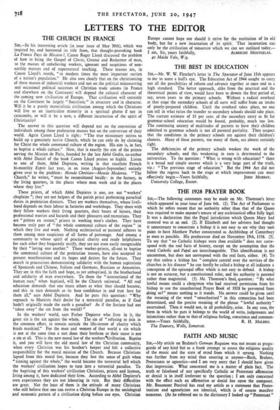LETTERS TO THE EDITOR
THE CHURCH IN FRANCE
SIR,--In his interesting article (in your issue of May 30th), which was inspired by, and borrowed its title from, that thought-provoking book La France Pays de Mission ?, Canon Roger Lloyd discussed the problem of how to bring the Gospel of Christ, Creator and Redeemer of man, to the masses of unbelieving workers, ignorant and suspicious of non- earthly matters and of supernatural teaching. These masses are, in Canon Lloyd's words, " in modern times the most important section of a nation's population." He also sees clearly that on the christianising of these masses of industrial workers and not on the political manoeuvring and occasional political successes of Christian trade unions (in France and elsewhere on the Continent) will depend the cultural character of the coming new civilisation of Europe. That civilisation will certainly on the Continent be largely " Socialistic " in structure and in character. Will it be a purely materialistic civilisation among which the Christians will live as an inarticulate minority in a spiritual ghetto if not in catacombs, or will it be a new, a different incarnation of the spirit of Christianity?
The answer to this question will depend not on the conversion of individuals among those proletarian masses but on the conversion of their world. Again Canon Lloyd is right: "The true missionary strives to build up a genuinely native Church, which he can only do by claiming for Christ the whole communal culture of the region. His aim is, in fact, to baptise a whole culture." Now, that is exactly the aim of the priests serving the Mission de Paris, founded by the late Abbe Godin, co-author with Abbe Daniel of the book Canon Lloyd praises so highly. Listen to one of them, Abbe Depierre, writing in that excellent French bi-monthly Esprit last year, in an issue (August-September) entirely given over to the problem: Monde Chritien—Monde Moderne. "The Church," he writes, "must be reconstituted locally: in the factory, in
• the living quarters, in the places where men work and in the places where they live."
These priests, of which Abbe Depierre is one, are not " workers' chaplains "; they are not helpers of the parish priest performing parochial duties in proletarian districts. They are workers themselves, whose liveli- hood depends on their labour in factories and workshops. They share with their fellow workers their living quarters, their hours of leisure, their professional worries and hazards and their pleasures and recreations. They are " pretres en veston," priests in working men's clothes. They have become truly part of " the whole communal culture of the region " in which they live and work. Nothing ecclesiastical or pastoral adheres to them among men suspicious of all forms of patronage. And among a community to whose spirit of practical charity and ready helpfulness for each other they frequently testify, they are not even easily recognisable by their " loving one another." These worker-priests, all-out to baptise the communal culture of the proletarian masses, have also accepted its present manifestations and its hopes and desires for the future. They march in processions demonstrating solidarity with the human aspirations of Spaniards and Chinese, Italians and Germans, Russians or Annamites. They see in this the faith and hope, as yet unbaptised, in the brotherhood and solidarity of man everywhere. To them the " international of the human race," when baptised, will be the Church universal. " All real education demands that one treats others as what they should become, and this in turn demands as its base confidence in and true love for them all," says Abbe Depierre. And he puts this question: " Why reproach to Marxists their desire for a terrestrial paradise, as if God hadn't originally made the earth a paradise? As if the Saviour had not ' taken away' the sin from the world? "
In the workers' world, says Father Depierre who lives in it, the great sin is the sin against the whole. The sin of " refusing to join in the common effort, to remain outside the life-stream of charity which binds mankind." For the men and women of that world a sin which is not at the same time a tort done their brethren or their cause is not a sin at all. This is the new moral law of the workers4civilisation. Baptise it, and you will have the old moral law of the Christian community, when every Christian was his brother's keeper and felt a collective responsibility for the moral mission of the Church. Because Christians lapsed from this moral law, because they lost the sense of guilt when " sinning against the whole," the world became the terrestrial hell which the workers' civilisation hopes to turn into a terrestrial paradise. To the baptising of this workers' civilisation Christians, priests and laymen, living among it, have dedicated their lives. According to Abbe Depierre's own experiences they are not labouring in vain. But their difficulties are great. Not the least of them is the attitude of many Christians who still believe that one can revive a Christian Europe in the sociological and economic pattern of a civilisation dying before our eyes. Christian Europe cannot hope nor should it strive for the restitution of its old body, but for a new incarnation of its spirit. That incarnation can only be the civilisation of tomorrow which we can see outlined today.—


































 Previous page
Previous page